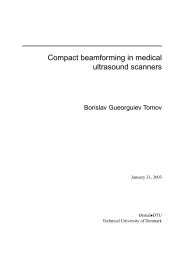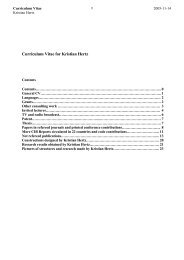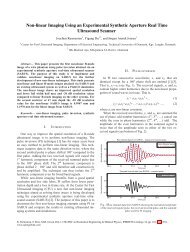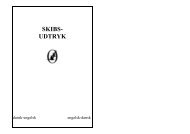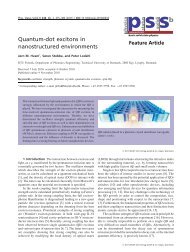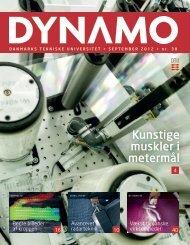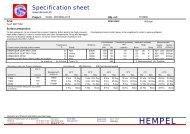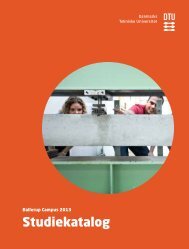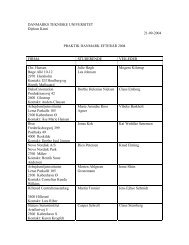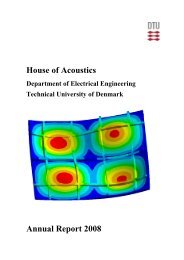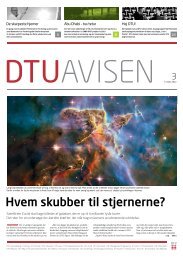Role of Intestinal Microbiota in Ulcerative Colitis
Role of Intestinal Microbiota in Ulcerative Colitis
Role of Intestinal Microbiota in Ulcerative Colitis
Create successful ePaper yourself
Turn your PDF publications into a flip-book with our unique Google optimized e-Paper software.
Discussion and conclusion<br />
163<br />
7. Discussion and perspectives<br />
Villoslada et al., 2006;Rodriguez‐Cabezas et al., 2010). Additionally, Casellas et al. (2007)<br />
demonstrated that a mixture <strong>of</strong> FOS and <strong>in</strong>ul<strong>in</strong> reduced disease activity <strong>in</strong> humans with UC after<br />
prebiotic consumption.<br />
The decreased levels <strong>of</strong> C. coccoides group, C. leptum subgroup and Desulfovibrio spp. after AOS<br />
and FOS <strong>in</strong>cubation implied that these bacterial groups are not able to utilize AOS or FOS (paper<br />
3). This is <strong>in</strong> agreement with results from database search <strong>of</strong> gene sequences that revealed that<br />
only few species <strong>of</strong> C. coccoides group, C. leptum subgroup and Desulfovibrio spp. conta<strong>in</strong> α‐L‐<br />
arab<strong>in</strong><strong>of</strong>uranosidases (EC 3.2.1.55), and/or fructan β‐(2,1)‐fructosidase (EC 3.2.1.153)<br />
(http://www.cazy.org/, 2011‐10‐11). Though, it was expected based on cross‐feed<strong>in</strong>g studies<br />
(Duncan et al., 2003;Belenguer et al., 2006;Marquet et al., 2009) that metabolites produced (e.g.<br />
acetate and lactate) dur<strong>in</strong>g the fermentation <strong>of</strong> FOS and AOS could stimulate the growth <strong>of</strong> C.<br />
coccoides group, C. leptum subgroup and Desulfovibrio spp., however that was not observed <strong>in</strong> the<br />
study <strong>of</strong> paper 3. Hence, C. coccoides group, C. leptum subgroup and Desulfovibrio spp. are not<br />
able to compete <strong>in</strong> a fermentor community with AOS and FOS as primary carbohydrate sources. In<br />
addition, the <strong>in</strong>ability <strong>of</strong> compet<strong>in</strong>g <strong>in</strong> the fermentor community with FOS and AOS was observed<br />
for Bacteroidetes. This was <strong>in</strong> l<strong>in</strong>e with previous communication, where species <strong>of</strong> Bacteroides<br />
have shown to be unable to utilize AOS (DP2‐5) and could only partly degrade FOS (Van Laere et<br />
al., 2000), even though genome sequenc<strong>in</strong>g has reveal that species <strong>of</strong> Bacteroides conta<strong>in</strong> GH such<br />
as α‐L‐arab<strong>in</strong><strong>of</strong>uranosidases (EC 3.2.1.55), arab<strong>in</strong>ases (EC 3.2.1.99) and/or fructan β‐(2,1)‐<br />
fructosidase (EC 3.2.1.153) (http://www.cazy.org/, 2011‐10‐22).<br />
S<strong>in</strong>ce feces is suggested to ma<strong>in</strong>ly consist <strong>of</strong> bacteria shed from the mucus or washed out from the<br />
lumen (Kurokawa et al., 2007;Booij<strong>in</strong>k et al., 2007), both lum<strong>in</strong>al and mucosal communities <strong>of</strong><br />
lactobacilli and bifidobacteria may have been stimulated after <strong>in</strong>cubation <strong>of</strong> AOS and FOS <strong>in</strong> Paper<br />
3. Previous work by Van den Abbeele et al. (2011c) has shown that prebiotic candidates such as<br />
long‐cha<strong>in</strong> arab<strong>in</strong>oxylans can stimulate bifidobacteria both <strong>in</strong> the mucus and lumen <strong>of</strong> humanized<br />
rats with Bifidobacterium longum be<strong>in</strong>g the most dom<strong>in</strong>ant Bifidobacterium species <strong>of</strong> both<br />
communities after prebiotic treatment.<br />
Collectively, the results from Paper 3 suggest that the positive effect already observed <strong>in</strong> human<br />
and animal trials us<strong>in</strong>g FOS may be applicable also for AOS. Hence presence and fermentation <strong>of</strong><br />
AOS may help prevent pro‐<strong>in</strong>flammatory conditions and enhance resistance to colonization <strong>of</strong>



